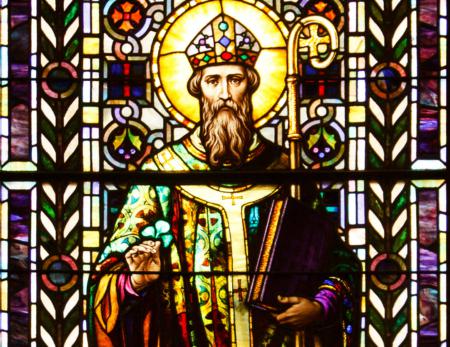Lessons from St. Patrick
St. Patrick is believed to have been born around the year 389 AD in Roman Britain. At the age of 16, he was captured by Irish raiders and taken to Ireland where he became a slave. He writes that at the time of his capture he "did not know the true God," that he and the other slaves were in their current condition because they "had gone away from God, and did not keep his commandments."
In captivity, realizing the error of his ways, he began to pray frequently throughout the days and nights. He relates that "I never felt the worse for it, and I never felt lazy -- as I realize now, the spirit was burning in me at that time." Six years later, a voice spoke to him while he slept, telling him that he would return home, and that a ship was waiting for him on the coast. Soon after, he fled his captors and found a ship waiting for him as had been foretold, and returned home a few months later.
As Patrick's faith grew, so did his desire to preach the Christian faith to the Irish. With this in mind, he travelled to Europe to train as a priest, and in 431 AD was appointed successor to the first Bishop of Ireland who had passed away.
During his early days in Ireland, he focused on the north and west regions where the Gospel had never been preached. He is alleged to have made many converts, and began establishing churches in the region. The churches did not resemble ours today, but a monastic system which better suited the society that was already in place. Initially he filled these sites with priests recruited from Europe, but after a time was able to draw upon native priests.
Patrick's good work was not always lauded, and met with resistance from the local druids, the native Irish population, and even the British clergy. In response to this criticism, Patrick published his "Confessio," or confession, which details his early life and his work among the Irish peoples. In his confession, he writes "See now: I call on God as witness in my soul that I tell no lie. Nor would I write to you looking for your praise, nor out of greed -- it's not that I hope for honor from any of you for myself. It is the honor which is not yet to be seen, but which is believe in the heart, which is what gives me satisfaction."
From a historical point of view, the exact details of St. Patrick's life are still debatable. We are left with some contemporary sources, but as a whole, they are inconsistent when relating specific dates and other details. Regardless, this, among other legends which have attached themselves to this well-known saint, do not detract from his mission or what we can learn from studying his life.
St. Patrick is described as a man of action, and his devotion to his vocation, his mission, and the courage he displayed in the face of his critics, are all characteristics to be universally admired. Similarly, his unwavering faith, evident in his "Confessio," is a reminder to us today that if we place our trust in God's hands, he will guide us through our trials and reveal our true purpose in life.
He closes his "Confessio" with the following: "I pray for those who believe in and have reverence for God... May none of them ever say that whatever little I did or made known to please God was done through ignorance. Instead, you can judge and believe in all truth that is was a gift from God. This is my confession before I die."
THOMAS LESTER IS THE ARCHIVIST OF THE ARCHDIOCESE OF BOSTON.



















